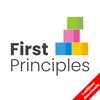
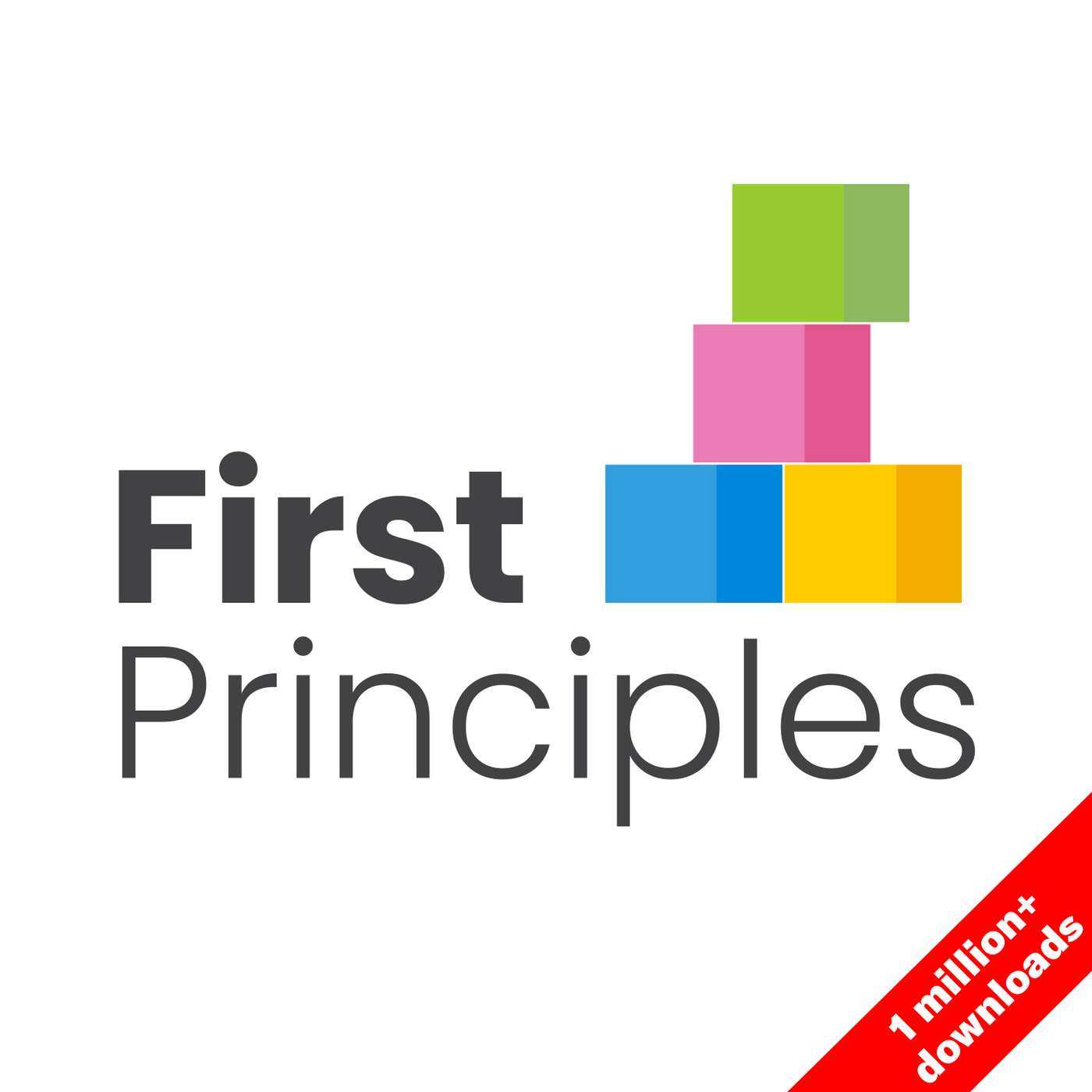
First Principles
The Ken
First Principles is a weekly interview podcast comprising authentic, candid, and insightful conversations between some of India’s most accomplished founders and business leaders, and Rohin Dharmakumar, The Ken’s CEO & co-founder.
From personal philosophies, mental models and decision making frameworks, to reading habits, parenting styles or personal interests, each episode will delve into what makes each of these leaders unique.
From personal philosophies, mental models and decision making frameworks, to reading habits, parenting styles or personal interests, each episode will delve into what makes each of these leaders unique.
Episodes
Mentioned books
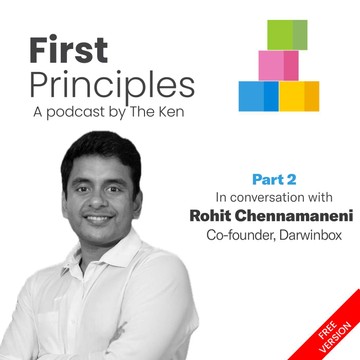
Jan 19, 2026 • 1h 2min
Part 2: Darwinbox’s Rohit Chennamaneni on leading without a CEO, the ‘show don’t tell’ product mindset, and why resilience beats intelligence
In the 2nd part of the 50th episode of First Principles, Rohit Chennamaneni, co-founder of Darwinbox, joins the show to talk about what changes after the early chaos of a startup fades.He explains how Darwinbox has operated without a CEO for years, how the 3 founders divide ownership of decisions instead of debating everything together, and why this structure helped them move faster as the company grew.Rohit also gets specific about product building. He talks about designing HR software that does not need training sessions or long explanations, why adoption matters more than feature depth, and how small product decisions can end up shaping behaviour across entire organisations.The conversation also turns inward. Rohit reflects on moments where intelligence stopped being the advantage he thought it was, why staying with uncomfortable problems mattered more, and how his understanding of leadership changed as Darwinbox scaled.This episode looks at company building through real decisions, and what it takes to keep going long after the excitement wears off.********This episode was produced by Uddantika Kashyap and mixed and mastered by Rajiv CN.Write to us at fp@the-ken.com with your feedback, suggestions, and guests you would want to see on First Principles.If you enjoyed this episode, please help us spread the word by sharing and gifting it to your friends and family.
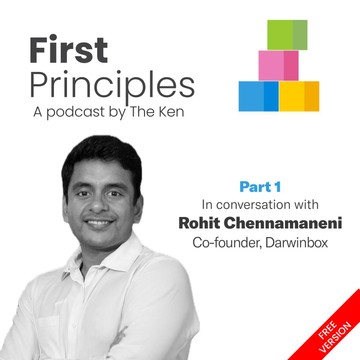
Jan 12, 2026 • 50min
Part 1: Darwinbox’s Rohit Chennamaneni on leading without a CEO, the ‘show don’t tell’ product mindset, and why resilience beats intelligence
Rohit Chennamaneni, co-founder of Darwinbox and an innovator in enterprise HR tech, dives into the unique structure of his company, which thrives without a CEO. He discusses how the three founders share decision-making power for faster growth. Rohit emphasizes the importance of product design that prioritizes user adoption over complexities. He reflects on the need for resilience over intelligence in leadership and shares insights on building an experience-led HR platform that truly resonates with employees.
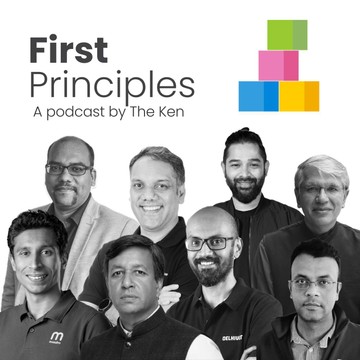
Dec 29, 2025 • 1h 39min
First Principles, second look: The 2025 wrap
What a year it's been.After a long hiatus and when we thought we'd closed the curtains for good, First Principles came back in April 2025 for Season 3. And what made this comeback so special? Simple: Rohin was genuinely excited to be back in the interviewing chair.That excitement is infectious. It showed up in every conversation and every question. This year, he sat down with eight incredible CEOs and founders who opened up about their journeys, their philosophies, their wins, and their struggles. These were deep, candid conversations about what it really takes to build something meaningful.In this special wrap episode, Rohin looks back at all eight conversations from 2025. He gives you the context about what it was really like sitting across from each guest, the moments that surprised him, the insights that stuck with him and then we play you the clips that mattered most. Think of it as a guided tour through the year's best moments.And here's the thing we're most proud of: First Principles has been named one of Apple's Best Shows of 2025. It's testament to you, our listeners, who make this more than just a podcast. You make it a community.And next year? It's going to be even better. More intriguing guests. More candid discussions. More first principles thinking applied.Here are all eight episodes from 2025: Episode 42: Vidit Aatrey on building a problem-first mindset into Meesho’s cultureEpisode 43: Sahil Barua on why Delhivery is the antithesis of moving fast and breaking thingsEpisode 44: Manish Sabharwal of Teamlease on creating great ancestors, India’s development journey and ‘regulatory cholesterol’Episode 45: Ultraviolette Automotive’s Narayan Subramaniam on tinkering, designing and learning by discardingEpisode 46: Anand Jain of Clevertap on starting with nothing and learning, building and leading as you go alongEpisode 47: Trilegal’s Rahul Matthan on the firm, the partnership, and the principlesEpisode 48: Indiagold’s Deepak Abbot on turning a nation’s ‘dead asset’ into credit scores and working capitalEpisode 49: Ixigo’s Aloke Bajpai on using empathy, customer experience, and resilience to both survive and thrive______Once again, thank you for listening to First Principles. Check out our newsletter and discover more at here. You can email us at fp@the-ken.com to share your thoughts, suggestions or anything else.This episode was produced by Uddantika Kashyap and mixed and mastered by Rajiv CN, our in-house audio engineer.See you next year,Team First Principles
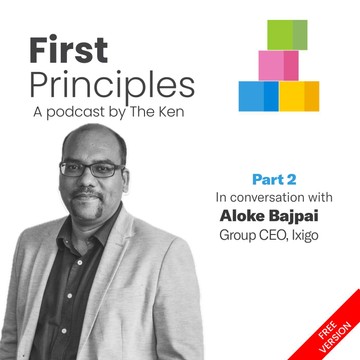
Dec 22, 2025 • 1h 9min
Part 2: Ixigo's Aloke Bajpai on using empathy, customer experience, and resilience to both survive and thrive
Hello and welcome back to First Principles. This is the part 2 of the 49th episode since we started, or the 8th episode of season 3.In this episode, I sit down with Aloke Bajpai, Group CEO of Ixigo, one of India's fastest-growing and most downloaded travel platforms. While most Indian OTAs followed the Western template of flights-first followed by hotels, Aloke and his co-founder Rajnish took a radically different path. The one that would take nearly 14 years before Ixigo became a full-blown OTA.Aloke takes us through Ixigo's unconventional journey, starting as a meta-search engine in 2007 that couldn't raise funding for over a year. We explore how the insight that 96% of Indians don't fly, led them to build a train-first platform, spending four years creating utility features without any monetization. He breaks down the technical innovation behind solving India-specific problems. Right from predicting waitlist confirmations using machine learning to creating a crowdsourced running status system using cell tower IDs when GPS and internet failed along railway tracks.A central theme is resilience through empathy. Aloke shares how near-death experiences during the 2008 global financial crisis and COVID-19 shaped Ixigo's culture. We discuss the founder's decision to go to zero salary, the whiteboard moment where the entire team transparently decided on salary cuts, and the contrarian choice to proactively refund customers during COVID even when the company was running out of money. Finally, Aloke argues that peace of mind, not tickets, is what travel companies should really be selling.
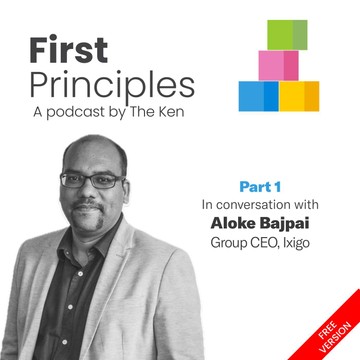
Dec 15, 2025 • 1h 2min
Part 1: Ixigo's Aloke Bajpai on using empathy, customer experience, and resilience to both survive and thrive
Aloke Bajpai, Co-founder and CEO of Ixigo, shares his fascinating journey with India’s leading travel platform. He discusses the unconventional train-first strategy that targets India's vast majority who travel by train, revealing insights into the technical innovations that solve unique travel problems. Aloke emphasizes resilience and empathy, recounting his experiences during the 2008 financial crisis and COVID-19, highlighting choices that prioritize customer trust and team solidarity. His narrative invites listeners to rethink travel solutions from a distinctly Indian perspective.
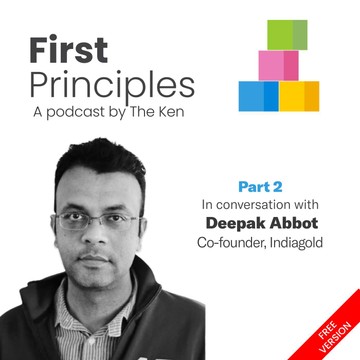
Nov 17, 2025 • 56min
Part 2: Indiagold's Deepak Abbot on turning a nation's 'dead asset' into credit scores and working capital
Hello, listeners, and welcome back to First Principles, Episode 48, or the 7th episode of season 3. This is part 2 of the conversation.The host, Rohin Dharmakumar, first crossed paths with Deepak Abbot back in April 2015, even before The Ken had been founded. Rohin was chasing down an insightful breakdown of the tech ecosystem's huge user numbers during the Free Basics debate, and Deepak, a veteran operator and former product head at Paytm, was the go-to source for his data-filled, analytical posts.That same data-driven curiosity is what led Deepak to walk away from corporate life in 2019. He was clear: he didn't want to just manage; he had years left to actively "build products, you know, with my own hands". What he built was Indiagold, targeting the massive opportunity of gold in a market VCs often dismissed as an 'old economy product'.In this episode, Rohin sat down with Deepak Abbot, co-founder of Indiagold, to discuss how they are transforming India's massive $1.5 trillion gold reserve—an asset often locked away and doing nothing—into a productive force. Deepak calls this gold a "dead asset" and explains that Indiagold’s mission is to change the mindset around it. They are not just giving gold loans; they are monetising a secured asset for the 250 million Indians who are excluded from formal credit due to thin or non-existent credit scores. By enabling customers to safely leverage their gold reserve, the company helps jumpstart a formal credit history and provides essential working capital.Listen in as Deepak charts his operator-to-founder journey, shares how he navigated initial VC skepticism, and details the strategy behind turning a seemingly archaic commodity into a modern fintech solution for one of India’s most fundamental credit problems. Plus, a fascinating look inside a unique company culture, including why Indiagold operates without a CEO.*****This episode was mixed and mastered by Rajiv CN.Write to us at fp@the-ken.com with your feedback, suggestions, and guests you would want to see on First Principles.If you enjoyed this episode, please help us spread the word by sharing and gifting it to your friends and family.*****
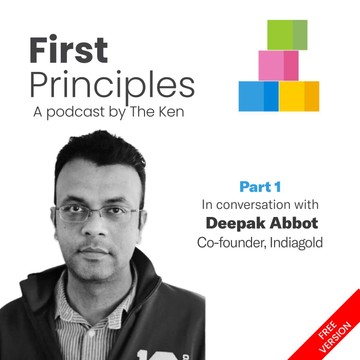
Nov 10, 2025 • 1h 6min
Part 1: Indiagold's Deepak Abbot on turning a nation's 'dead asset' into credit scores and working capital
Hello, listeners, and welcome back to First Principles, Episode 48, or the 7th episode of season 3. This is part 1 of the conversation.The host, Rohin Dharmakumar, first crossed paths with Deepak Abbot back in April 2015, even before The Ken had been founded. Rohin was chasing down an insightful breakdown of the tech ecosystem's huge user numbers during the Free Basics debate, and Deepak, a veteran operator and former product head at Paytm, was the go-to source for his data-filled, analytical posts.That same data-driven curiosity is what led Deepak to walk away from corporate life in 2019. He was clear: he didn't want to just manage; he had years left to actively "build products, you know, with my own hands". What he built was Indiagold, targeting the massive opportunity of gold in a market VCs often dismissed as an 'old economy product'.In this episode, Rohin sat down with Deepak Abbot, co-founder of Indiagold, to discuss how they are transforming India's massive $1.5 trillion gold reserve—an asset often locked away and doing nothing—into a productive force. Deepak calls this gold a "dead asset" and explains that Indiagold’s mission is to change the mindset around it. They are not just giving gold loans; they are monetising a secured asset for the 250 million Indians who are excluded from formal credit due to thin or non-existent credit scores. By enabling customers to safely leverage their gold reserve, the company helps jumpstart a formal credit history and provides essential working capital.Listen in as Deepak charts his operator-to-founder journey, shares how he navigated initial VC skepticism, and details the strategy behind turning a seemingly archaic commodity into a modern fintech solution for one of India’s most fundamental credit problems. Plus, a fascinating look inside a unique company culture, including why Indiagold operates without a CEO.*****This episode was mixed and mastered by Rajiv CN.Write to us at fp@the-ken.com with your feedback, suggestions, and guests you would want to see on First Principles.If you enjoyed this episode, please help us spread the word by sharing and gifting it to your friends and family.*****
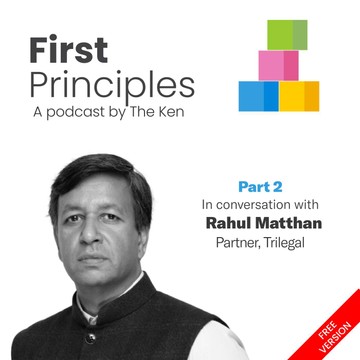
Sep 22, 2025 • 1h 3min
Part 2: Trilegal's Rahul Matthan on the firm, the partnership, and the principles
Hello and welcome back to First Principles. This is the 47th episode since we started, or the 6th episode of season 3.In this episode, I sit down with Rahul Matthan, a co-founder of Trilegal, one of India’s largest and most successful full-service law firms. While Rahul starts by questioning if a lawyer can be an entrepreneur, the conversation unfolds into a masterclass on the patient, principled art of building a lasting institution.Rahul provides a rare, inside look into the unique challenges of building a professional services firm—a business where the people are the product. He breaks down the counterintuitive models Trilegal adopted to foster a culture of collaboration over individual stardom. We explore their radical “all-equity partnership” and the “lockstep” compensation model, designed to de-risk the firm from becoming dependent on individual “rainmakers” and to align everyone’s incentives towards collective success.A key theme is the power of compounding principles. Rahul explains how foundational decisions made 25 years ago, such as not naming the firm after its founders and instilling a “firm before self” ethos, were critical for long-term, sustainable growth. He also shares the story behind Trilegal’s exponential 3X growth during the COVID period, attributing it not just to market demand but to a crucial, planned transition from a founder-led management to a new leadership team built for scale.Finally, Rahul offers a nuanced and critical perspective on the impact of AI on the legal profession. He argues that the real disruption won’t be in replacing senior experts, but in hollowing out the training ground for junior associates, posing a fundamental challenge to the apprenticeship model that professions rely on.*****This is the 2nd part of my conversation with him.*****This episode was mixed and mastered by Rajiv CN.Write to us at fp@the-ken.com with your feedback, suggestions, and guests you would want to see on First Principles.If you enjoyed this episode, please help us spread the word by sharing and gifting it to your friends and family.
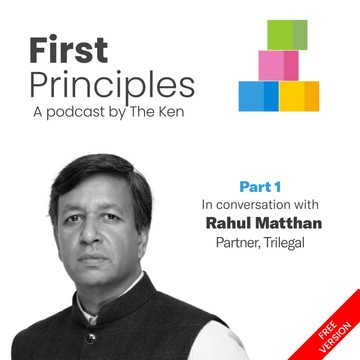
Sep 15, 2025 • 1h 9min
Part 1: Trilegal's Rahul Matthan on the firm, the partnership, and the principles
In this episode, Rohin Dharmakumar sits down with Rahul Matthan, a co-founder of Trilegal, one of India’s largest and most successful full-service law firms. While Rahul starts by questioning if a lawyer can be an entrepreneur, the conversation unfolds into a masterclass on the patient, principled art of building a lasting institution.Rahul provides a rare, inside look into the unique challenges of building a professional services firm—a business where the people are the product. He breaks down the counterintuitive models Trilegal adopted to foster a culture of collaboration over individual stardom. We explore their radical “all-equity partnership” and the “lockstep” compensation model, designed to de-risk the firm from becoming dependent on individual “rainmakers” and to align everyone’s incentives towards collective success.A key theme is the power of compounding principles. Rahul explains how foundational decisions made 25 years ago, such as not naming the firm after its founders and instilling a “firm before self” ethos, were critical for long-term, sustainable growth. He also shares the story behind Trilegal’s exponential 3X growth during the COVID period, attributing it not just to market demand but to a crucial, planned transition from a founder-led management to a new leadership team built for scale.Finally, Rahul offers a nuanced and critical perspective on the impact of AI on the legal profession. He argues that the real disruption won’t be in replacing senior experts, but in hollowing out the training ground for junior associates, posing a fundamental challenge to the apprenticeship model that professions rely on.This episode was mixed and mastered by Rajiv CN.Write to us at fp@the-ken.com with your feedback, suggestions, and guests you would want to see on First Principles.If you enjoyed this episode, please help us spread the word by sharing and gifting it to your friends and family.
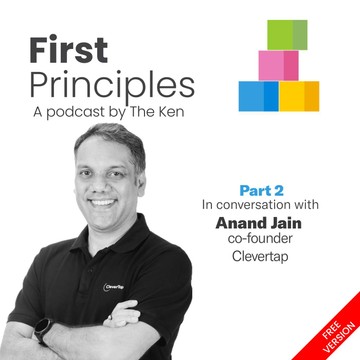
5 snips
Aug 18, 2025 • 1h 11min
Part 2: Anand Jain of Clevertap on starting with nothing and learning, building and leading as you go along
Anand Jain, co-founder of CleverTap, shares his entrepreneurial journey from starting a business at age 12 to leading a successful customer engagement platform. He discusses the importance of resilience and innovation, fostering a collaborative company culture, and the transformative impact of AI on customer insights. Anand emphasizes lifelong learning, the evolution of leadership in tech startups, and unique hiring practices that focus on passion. He also reflects on how trekking can serve as a metaphor for personal growth and overcoming challenges.


